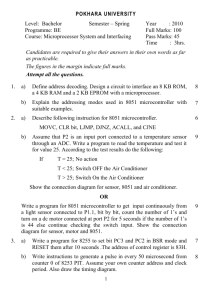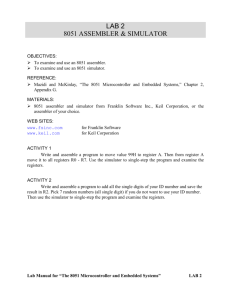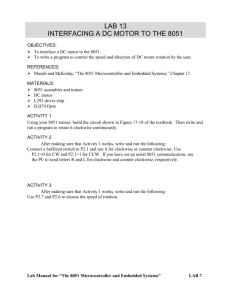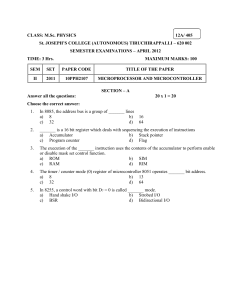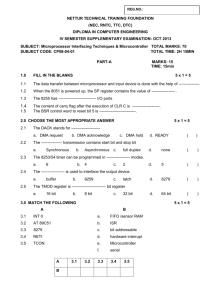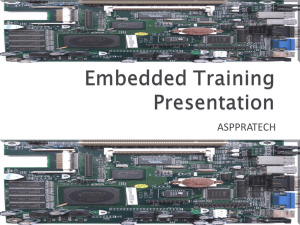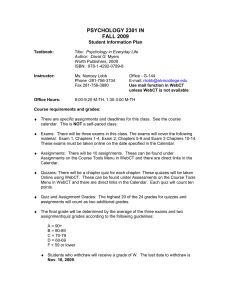CET 3503 Syllabus
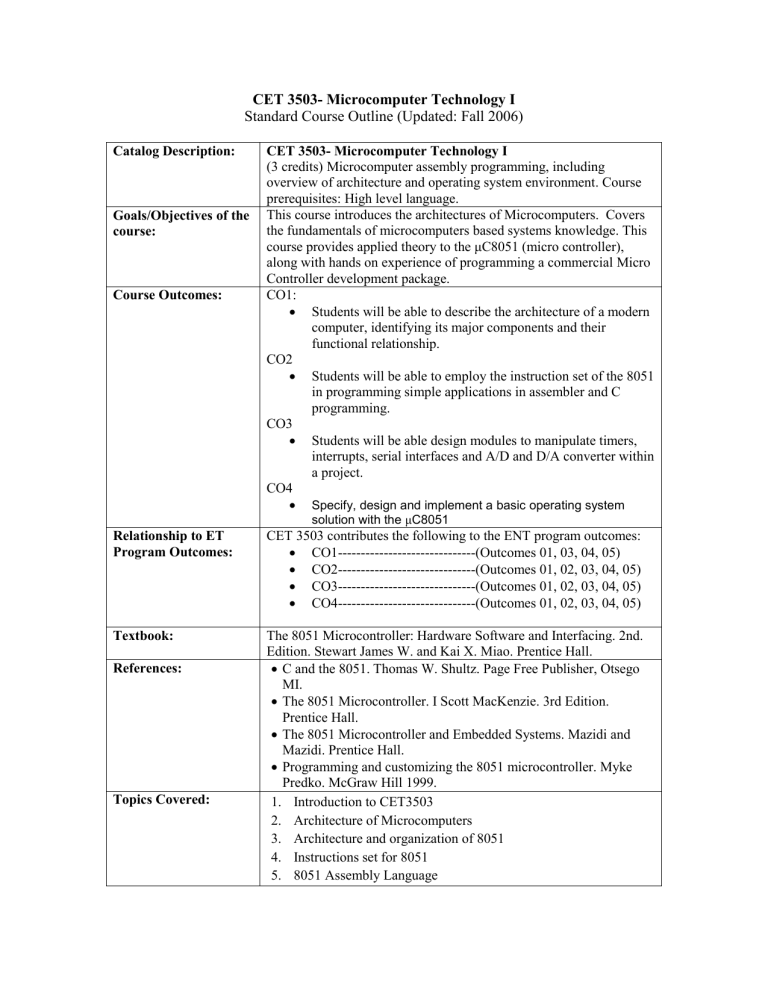
Catalog Description:
CET 3503- Microcomputer Technology I
Standard Course Outline (Updated: Fall 2006)
Goals/Objectives of the course:
Course Outcomes:
Relationship to ET
Program Outcomes:
Textbook:
References:
Topics Covered:
CET 3503- Microcomputer Technology I
(3 credits) Microcomputer assembly programming, including overview of architecture and operating system environment. Course prerequisites: High level language.
This course introduces the architectures of Microcomputers. Covers the fundamentals of microcomputers based systems knowledge. This course provides applied theory to the μC8051 (micro controller), along with hands on experience of programming a commercial Micro
Controller development package.
CO1:
Students will be able to describe the architecture of a modern computer, identifying its major components and their functional relationship.
CO2
Students will be able to employ the instruction set of the 8051 in programming simple applications in assembler and C programming.
CO3
Students will be able design modules to manipulate timers, interrupts, serial interfaces and A/D and D/A converter within a project.
CO4
Specify, design and implement a basic operating system solution with the μ C8051
CET 3503 contributes the following to the ENT program outcomes:
CO1------------------------------(Outcomes 01, 03, 04, 05)
CO2------------------------------(Outcomes 01, 02, 03, 04, 05)
CO3------------------------------(Outcomes 01, 02, 03, 04, 05)
CO4------------------------------(Outcomes 01, 02, 03, 04, 05)
The 8051 Microcontroller: Hardware Software and Interfacing. 2nd.
Edition. Stewart James W. and Kai X. Miao. Prentice Hall.
C and the 8051. Thomas W. Shultz. Page Free Publisher, Otsego
MI.
The 8051 Microcontroller. I Scott MacKenzie. 3rd Edition.
Prentice Hall.
The 8051 Microcontroller and Embedded Systems. Mazidi and
Mazidi. Prentice Hall.
Programming and customizing the 8051 microcontroller. Myke
Predko. McGraw Hill 1999.
1.
Introduction to CET3503
2.
Architecture of Microcomputers
3.
Architecture and organization of 8051
4.
Instructions set for 8051
5.
8051 Assembly Language
Computer Usage: This class will utilize WebCT and FEEDS Video Streaming. All announcements and news will be posted on WebCT.
Laboratory Exercises: All laboratory exercises will be performed at the student’s home using the hardware and software purchased for this course.
Required Equipment: Silicon Laboratories C8051F020DK-U Microcontroller Development
Kit. Available through Website http://www.silabs.com. An IBM PC
(under Windows 95, 98, 2000, XP), with USB or Comm. port, CD-
Drive is required.
Course Grading: There will be two term exam, a final comprehensive exam and a project. There will be homework assignments to be completed through WebCT.
1st Exam 15 %
2nd Exam 15%
Final Exam 20 %
Homework Assignments 30 %
Projects 20 %
Library Usage:
6.
C8051F020DK board
7.
C Programming for 8051
8.
C Programming for 8051 Examples
9.
8051 Applications
10.
System design Techniques/Project discussion
Students are encouraged to consult library and Internet references to aid in researching course material, complete written projects, and prepare oral presentations.
Course Assessment:
Course Policies:
Useful methods for assessing the success of this course in achieving the intended outcomes listed above:
CO1: Homework and exams.
CO2: Homework, exam and assignments with the DK
C8051F020DK board.
CO3: Homework, exam and assignments with the DK
C8051F020DK board.
CO4: Specify, design and implement a basic operating system solution with the μ C8051
Professionalism and Ethics :
Academic dishonesty in any form will not be tolerated!!! Violations of student academic behavior standards are outlined in The Golden
Rule, the University of Central Florida's Student Handbook. See ttp://www.goldenrule.sdes.ucf.edu/ for further details.
Per university policy and plain classroom etiquette, mobile phones, pagers, etc . MUST be silenced during all classroom lectures and exams. Those not heeding this rule will be asked to leave the classroom immediately so as to not disrupt the learning environment.
Additional Course
Information, Policies and Expectations:
Computer Skills/Usage
• WebCT and e-mail will be used to communicate with students and disseminate materials and assignments throughout the course. So LIVE and FEEDS students should check WebCT and
Course Coordinator:
their e-mail at least once per day.
Course Assignments
• All assignments are due on or BEFORE the scheduled due date and time. Absolutely NO late assignments will be accepted.
• All assignments must be submitted via WebCT, unless specified otherwise.
• All assignments must be submitted in a high-quality and professional manner. They should be well-written and understandable.
The steps/methods of solving the problems should be clearly stated.
• Students are encouraged to collaborate outside of class to discuss and debate course concepts. However, all assignments MUST be completed and written up individually. Each student is required to turn in his or her own solutions. If the assignment has been designated a team assignment by the instructor, one copy of the assignment solutions containing the names of all team members is required.
Exams
All exams will be on line. Students will be given a time window during which the exam can be taken. If students have problems submitting their exam for any reason (system is down etc.), they need to get in touch with Kim Okamoto, the WebCT specialist for the college at 407-823-5248 or email her at kokamoto@mail.ucf.edu
.
Any other question about the exam should be directed to the instructor.
Makeup Assignments and Examinations
•
Make-up exams will only be permitted under extreme circumstances. There will be material that is not covered in the textbook. The student will have to be responsible to correspond with the instructor via WebCT or email.
Dr. Alireza Rahroo
